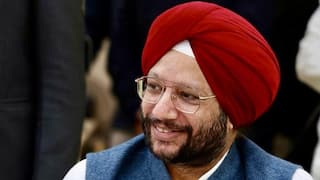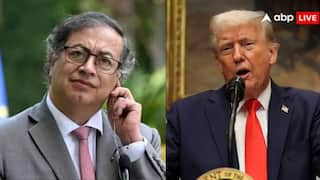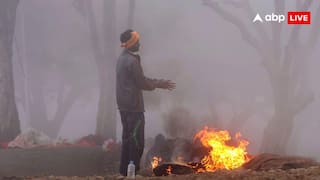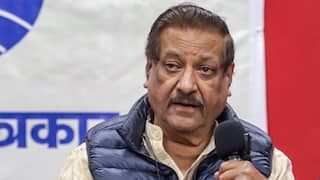India Indirectly Benefited From Russian Oil Price Cap: EU Envoy Ugo Astuto
Exclusive Interview: Ugo Astuto, EU Ambassador to India, said Europe is continuing to have a ‘conversation’ with India because ‘Russian aggression’ towards Ukraine is continuing & there is devastation

India has “indirectly” benefited from the price cap imposed on Russian oil and petroleum products, a policy undertaken by the West, helping New Delhi to purchase the commodity at a discounted rate while ensuring that the crude prices do not surge in the global markets, according to Ugo Astuto, Ambassador of the European Union (EU) to India. In an exclusive interview to ABP Live, the EU envoy said, Europe “respects and understands” India’s position in the ongoing Russia-Ukraine War that began in February 2022.
“India has its own reasons and we respect and understand the particular Indian position. What we try to do as the European Union and more broadly as a price cap coalition is to keep the price of oil stable, globally and at the same time make sure Russia does not gain any undue profit through its trade in oil. Because this profit would go to fuel and finance the illegal aggression against Ukraine,” Astuto said.
He also said, “And I think so far the price cap has shown its ability to achieve its objectives. We have seen a stabilisation in the global oil prices. I think India has also indirectly benefited from it as it’s currently purchasing Russian oil at a discount. More broadly, we continue to have a conversation with India because the aggression is continuing. We have incredible devastation happening with mounting war crimes. So, this has to stop and the Russian troops need to withdraw.”
In December 2022, the ‘Price Cap Coalition’ set the price cap on Russian crude oil at $60 per barrel with an aim to reduce Russia’s revenues. The coalition is composed of Australia, Canada, the EU, Japan, the UK, and the US.
“The voice of India is important and influential. So it is very important what the Prime Minister (Narendra Modi) said last year,” Astuto said referring to Modi’s meeting with Russian President Vladimir Putin in Samarkand last year on the sidelines of the SCO meeting when the Prime Minister told him “This is not an era of war.”
On India’s role as the current G20 chair as far as the war is concerned, the Ambassador said, “What we appreciate is that India has repeatedly made it clear it will try to do its utmost to stop the conflict. The war must end and the Russian troops must withdraw. This invasion must stop.”
However, he said, whether India invites Ukraine President Volodymyr Zelenskyy to address the G20 Summit, albeit virtually, is a decision that New Delhi will take.
ALSO READ | China Has Converted Rather Peaceful Border Into A Live Border, Ex-Envoy Ashok Kantha Says
‘Scene Is Set’ For Concluding Pacts On Trade, Investment, GI
On the fast-moving negotiations on the India-EU free trade agreement (FTA), the Ambassador said, there has been “progress” during the last round and that the “scene is set” for concluding the remaining three on investments and geographical indications.
“There has been progress, particularly in the last round. We’ve seen some signals. We need to find some bridging solutions. At the same time it’s a fact that this is very a complex negotiation. So I think it’s understandable that it takes time,” he said.
The next round of negotiations are going to be held in New Delhi from 19-23 June. In January 2022, India and the EU resumed negotiations for a free trade agreement, investment protection and Geographical Indications (GI), after it was stalled for almost eight years.
“We have political commitment at the highest level. We have full engagement and clear determination from both sides … But what we are aiming at is a comprehensive and balanced free trade agreement. And, as the European Union we have a good record in negotiating and concluding of these FTAs to the benefit of all sides,” he added.
He said both sides are working towards creating secure and resilient global supply chains, which is why the EU-India Trade and Technology Council (TTC) was created. The only other country with which the EU has a TTC with the US.
ALSO READ | Defence Ministry Okays USD 3 Billion Armed Drones Deal, To Be Jointly Announced By Modi And Biden
China Peace Plan Is ‘Not’ A Peace Plan
According to the Ambassador, the bilateral relations between EU and China are “complex and important”. He also added that the so-called peace plan that Chinese President Xi Jinping has chalked out to stop the war is not an actual peace plan but about “positions”.
“China is a partner and its indispensable in addressing challenges such as the fight against climate change. Then it’s a competitor and in that respect, we need to establish a level-playing field and finally, it’s a systemic rival because the system of governance in China is clearly different and is not underpinned by the same values of democracy and individual rights,” said Astuto.
He also made it clear that Brussels has told Beijing to not to supply weapons to Russia and “fuel the conflict” even as both China and Russia have vowed to get closer under the ethos of a “no limits friendship”.
“China is also a positive player, contributing to the secession of hostility and withdrawal of Russian forces from Ukrainian territory,” he said.
But he believes that the peace plan is “not really a peace plan but a series of Chinese positions … Some of these positions are interesting and this caution can continue but the point is that Ukrainians have a right to decide about the role of the future. I think the initial proposition must be that we have an aggressor and a victim. And we have an invasion ongoing and we certainly cannot condone any invasion.”
He said the Russian war is a “serious” violation of the UN Charter that too by a Permanent Member of the UN Security Council. Russia is one of five Permanent Members, also called the P-5, of the UNSC.
“As far as the European Union is concerned we are supporting Ukraine. We support Ukraine politically, militarily, financially and we will continue to do so,” he added.
Related Video
India@2047 Summit: Modi Calls for Innovation, Reforms, and National Resolve
Top Headlines






































